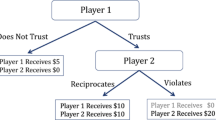Abstract
Often, when several norms are present and may be in conflict, individuals will display a self-serving bias, privileging the norm that best serves their interests. Xiao and Bicchieri (J Econ Psychol 31(3):456–470, 2010) tested the effects of inequality on reciprocating behavior in trust games and showed that—when inequality increases—reciprocity loses its appeal. They hypothesized that self-serving biases in choosing to privilege a particular social norm occur when the choice of that norm is publicly justifiable as reasonable, even if not optimal for one of the parties. In line with the literature on motivated reasoning, this justification should find some degree of support among third parties. The results of our experimental survey of third parties support the hypothesis that biases are not always unilateral selfish assessments. Instead, they occur when the choice to favor a particular norm is supported by a shared sense that it is a reasonable and justifiable choice.
Similar content being viewed by others
References
Bicchieri C. (2006) The grammar of society: The nature and dynamics of social norms. Cambridge University Press, Cambridge
Bicchieri C., Chavez A. (2010) Behaving as expected: Public information and fairness norms. Journal of Behavioral Decision Making 23(2): 161–178
Bicchieri, C., & Muldoon, R. (2011). Social norms. In The Stanford Encyclopedia of Philosophy. http://plato.stanford.edu/entries/social-norms/.
Bicchieri C., Xiao E. (2009) Do the right thing: But only if others do so. Journal of Behavioral Decision Making 22: 191–208
Buhrmester M., Kwang T., Gosling S. D. (2011) Amazon’s Mechanical Turk. Perspectives on Psychological Science 6(1): 3
DeScioli P., Kurzban R. (2009) The alliance hypothesis for human friendship. PloS ONE 4(6): e5802
Fishbein M. (1967) A consideration of beliefs and their role in attitude measurement. In: Fishbein M. (Ed.) Readings in attitude theory and measurement. Wiley, New York
Kunda Z. (1990) The case for motivated reasoning. Psychological Bulletin 108: 480–498
Mercier H. (2011) What good is moral reasoning?. Mind & Society 10(2): 131–148
Mercier H., Sperber D. (2011) Why do humans reason? Arguments for an argumentative theory. Behavioral and Brain Sciences 34(2): 57–74
Paolacci G., Chandler J., Ipeirotis P.G. (2010) Running experiments on Amazon Mechanical Turk. Judgment and Decision Making 5(5): 411–419
Sanitioso R., Kunda Z., Fong G. T. (1990) Motivated recruitment of autobiographical memories. Journal of Personality and Social Psychology 59(2): 229–241
Snyder M., Kleck R. E., Strenta A., Mentzer S. J. (1979) Avoidance of the handicapped: An attributional ambiguity analysis. Journal of Personality and Social Psychology 37(12): 2297–2306
Valdesolo P., DeSteno D. (2008) The duality of virtue: Deconstructing the moral hypocrite. Journal of Experimental Social Psychology 44: 1334–1338
Xiao E., Bicchieri C. (2010) When equality trumps reciprocity. Journal of Economic Psychology 31(3): 456–470
Author information
Authors and Affiliations
Corresponding author
Rights and permissions
About this article
Cite this article
Bicchieri, C., Mercier, H. Self-serving biases and public justifications in trust games. Synthese 190, 909–922 (2013). https://doi.org/10.1007/s11229-012-0192-x
Received:
Accepted:
Published:
Issue Date:
DOI: https://doi.org/10.1007/s11229-012-0192-x




